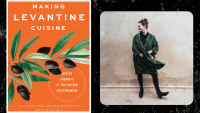Anny Gaul

School of Languages, Literatures, and Cultures
Assistant Professor, Department Chair, Arabic
3128 H.J. Patterson Hall
Get Directions
Education
B.A., , Yale University
M.A., , Georgetown University
Ph.D., , Georgetown University
Research Expertise
Arabic Language
Food Studies
Gender and Sexuality Studies
Middle East
Anny Gaul is a cultural historian whose research and teaching interests lie at the intersections of food, gender, and culture in the Arabic-speaking world. She is the author of Nile Nightshade: An Egyptian Culinary History of the Tomato (forthcoming from University of California, 2025) co-editor of Making Levantine Cuisine: Modern Foodways of the Eastern Mediterranean (University of Texas, 2021).
Her scholarship has appeared in Gender & History, Middle Eastern Literatures, Gastronomica, Global Food History, Mashriq & Mahjar, the Journal of Women’s History and the Journal of Middle East Women’s Studies. Her work has also been featured in The Nation, Eater, al-Quds al-Arabi, and Ahram Online.
(Photo credit: Nicole McConville)
Publications
From Kitchen Arabic to Recipes for Good Taste: Nation, Empire, and Race in Egyptian Cookbooks
Winner of the Global Food History Prize for an Emerging Food Historian, this article discusses a previously understudied genre of Arabic cookbooks written by and for women during Egypt’s colonial period.
Author/Lead: Anny Gaul
Between the 1880s and the 1950s, a new genre of cookbooks appeared in Egypt. Largely written by women, these texts addressed the housewives of Egypt’s expanding middle classes. This essay describes how the genre’s authors instructed women to nourish the nascent Egyptian nation. In prescribing specific flavors to notions of “good taste,” these cookbooks’ eclectic combinations of recipes oriented Egyptian readers towards Europe and the Arab East, rather than towards the rest of the African continent. This analysis situates these cookbooks within the overlapping spheres of Egyptian rule in Sudan, the British occupation of Egypt and Sudan, and anticolonial nationalism. It argues that studying gendered and domestic forms of labor, like cooking, can enrich our understandings of how national identity formation hinges on the construction of racial, ethnic, and class hierarchies. Cookbooks thus offer a unique perspective on the relationships between nation, empire, gender, and race.
Transnational Dimensions of Moroccan Gender History Sources, Access, Politics
This roundtable essay discusses the promises and challenges of adopting a transnational analytical approach to gender history in modern Morocco.
Author/Lead: Anny GaulThis essay is a contribution to a roundtable that brings together the work of gender historians whose research collectively ranges from Morocco to Afghanistan, and traces a variety of connections across the Mediterranean and the Atlantic. Collectively, we demonstrate the many ways that women in the Middle East and North Africa collaborated with one another and with women in other world regions in the name of national independence, women’s rights, and economic justice, often shaping gender norms in the process. This contribution demonstrates that multiple generations of Moroccan women activists engaged with ideas and movements circulating through the Middle East and beyond as they advocated for liberation. It examines how the nation-state sets up particular barriers to narrating these vital transnational dimensions of women's history in Morocco.
Journal of Middle East Women’s Studies 17:3, November 2021
Making Levantine Cuisine: Modern Foodways of the Eastern Mediterranean
From family staples to national dishes, Making Levantine Cuisine addresses the transnational histories and cultural nuances of the ingredients, recipes, and foodways that place the Levant onto an ever-shifting global culinary map.
Author/Lead: Anny GaulNon-ARHU Contributor(s): Graham Auman Pitts, Vicki Valosik
Melding the rural and the urban with the local, regional, and global, Levantine cuisine is a mélange of ingredients, recipes, and modes of consumption rooted in the Eastern Mediterranean. Making Levantine Cuisine provides much-needed scholarly attention to the region’s culinary cultures while teasing apart the tangled histories and knotted migrations of food. Akin to the region itself, the culinary repertoires that comprise Levantine cuisine endure and transform—are unified but not uniform. This book delves into the production and circulation of sugar, olive oil, and pistachios; examines the social origins of kibbe, Adana kebab, shakshuka, falafel, and shawarma; and offers a sprinkling of family recipes along the way. The histories of these ingredients and dishes, now so emblematic of the Levant, reveal the processes that codified them as national foods, the faulty binaries of Arab or Jewish and traditional or modern, and the global nature of foodways. Making Levantine Cuisine draws from personal archives and public memory to illustrate the diverse past and persistent cultural unity of a politically divided region.
Read More about Making Levantine Cuisine: Modern Foodways of the Eastern Mediterranean
Recipes for a Field: Translating Middle Eastern Cookbooks and the Horizons of Food Studies
This review essay considers what three premodern Arabic and Persian cookbooks (now available in English translation) might offer the field of food studies
Author/Lead: Anny GaulGastronomica (2019) 19 (2): 87–95.


